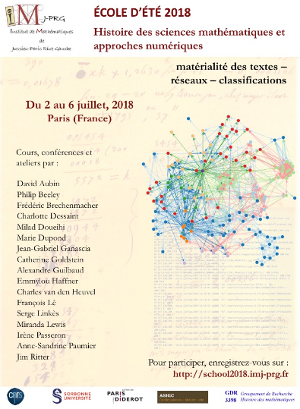As part of an innovative collaboration between Oxford and the Sorbonne, here at EMLO we’re delighted to announce that applications for a three-year fully funded fellowship are being accepted currently from students wishing to pursue doctoral studies in the history of science, in mathematical sciences, in digital humanities, or in computer science. Details of the fellowship have been provided in both English and in French, and for further details please contact Alexandre Guilbaud at the Sorbonne (his email address may be found below). Should you choose to apply, good luck!

Call for applications:
English
The successful candidate’s PhD thesis will involve the scholarly study of correspondence networks from the perspective of both the history of sciences and the digital humanities. In particular, the student should consider how to structure a corpus made up of networks of interconnected correspondence data; the new research questions for the history of science that arise from such a corpus; the methodologies that can be put in place to answer these questions; and the extent to which the development of suitable digital analysis and research tools might contribute to the exploration of this type of corpus.
The doctoral fellowship is part of a scientific collaboration between the Faculty of Science and Engineering of Sorbonne University and the Faculty of History of the University of Oxford. The candidate will work in the Digital Humanities team at the Institut des sciences du calcul et des données (ISCD) of Sorbonne University (Paris, France) and will carry out a period of research at the University of Oxford (UK) within the framework of the Cultures of Knowledge research project/Early Modern Letters Online [EMLO]. An association either with Oxford’s Centre for the History of Science, Medicine, and Technology or with the Mathematical Institute is possible during the stay.
The doctoral fellow will benefit from a three-year funding by the Faculty of Science and Engineering of Sorbonne University. The candidate must have a strong background in digital humanities, history of sciences, mathematics, or computer sciences. Competences in at least two of these fields will be particularly appreciated.
To apply, please send your c.v. and a description of your research project to: alexandre.guilbaud@sorbonne-universite.fr. You may also e-mail Alexandre at this address for further information regarding the fellowship.
French
La thèse proposée porte sur l’étude intellectuelle des réseaux de correspondances du double point de vue de l’histoire des sciences et des humanités numériques. Il s’agira en particulier de se demander comment structurer un corpus constitué de réseaux de données de correspondances interconnectées, quelles questions nouvelles un tel corpus permet de se poser en histoire des sciences, quelles méthodologies mettre en place pour y répondre, et dans quelle mesure le développement d’outils numériques d’analyse et de recherche adaptés peut permettre de contribuer à l’exploration de ce type de corpus.
Cette thèse fait l’objet d’une collaboration scientifique entre la Faculté des sciences et ingénierie de Sorbonne Université et l’équipe EMLO de l’Université d’Oxford. Le candidat travaillera dans l’équipe « Humanités numériques » de l’Institut des sciences du calcul et des données (ISCD) de Sorbonne Université (Paris, France) et effectuera un séjour de recherche à l’Université d’Oxford (UK) dans le cadre du projet de recherche Cultures of Knowledge/Early Modern Letters Online [EMLO]. Une collaboration avec le Center for the History of Science, Medicine and Technology ou avec le Mathematical Institute d’Oxford sera possible durant ce séjour.
La thèse est financée pour trois ans par la Faculté des sciences et ingénierie de Sorbonne Université. Le candidat devra disposer d’une solide formation en humanités numériques, en histoire des sciences, en mathématiques ou en informatique. Une double compétence sera particulièrement appréciée.
Pour candidater, envoyez votre cv et le descriptif de votre projet de recherche à l’adresse alexandre.guilbaud@sorbonne-universite.fr. Vous pouvez également écrire à cette adresse pour tout complément d’information sur la thèse.


 With a plenary to deliver and a series of workshops to run in the course of the week, Philip Beeley, Charlotte Marique, and I ‘packed’ a variety of sample letters from the correspondences of early modern practitioners of mathematics, all of whom either have catalogues in EMLO or for whom we are in the process of preparing an epistolary inventory. Along with letters by John Collins, we took (in alphabetical order to avoid any excuse for dispute!) examples from the correspondences of
With a plenary to deliver and a series of workshops to run in the course of the week, Philip Beeley, Charlotte Marique, and I ‘packed’ a variety of sample letters from the correspondences of early modern practitioners of mathematics, all of whom either have catalogues in EMLO or for whom we are in the process of preparing an epistolary inventory. Along with letters by John Collins, we took (in alphabetical order to avoid any excuse for dispute!) examples from the correspondences of